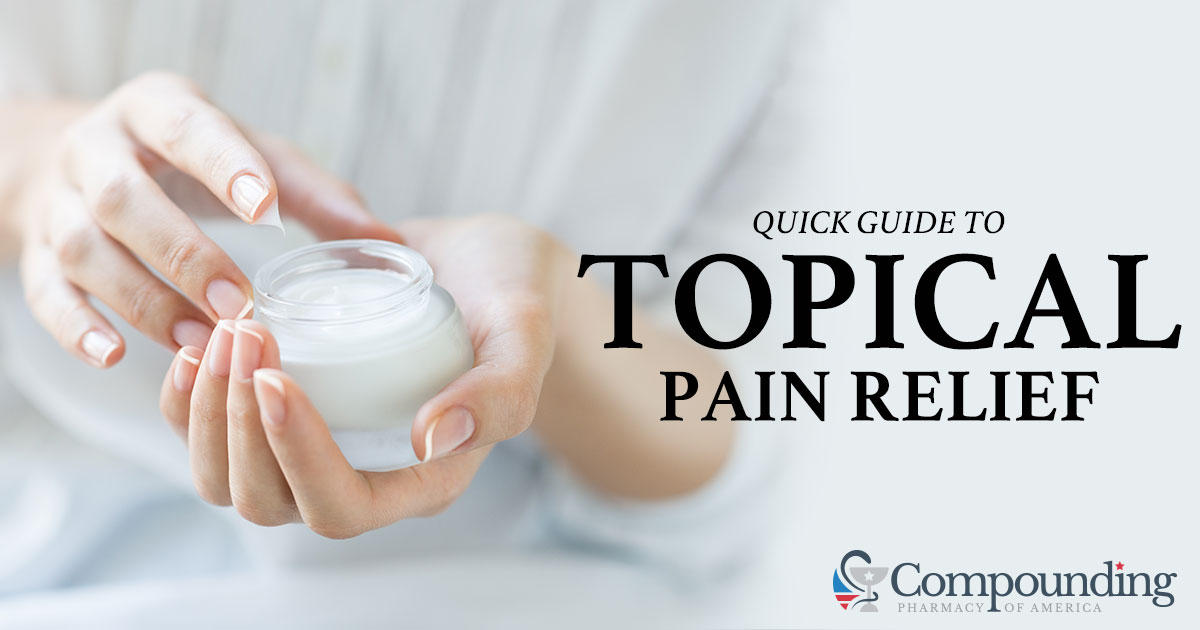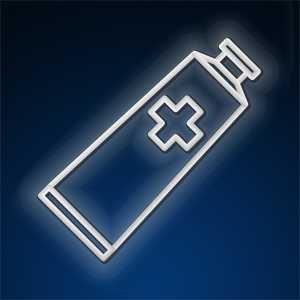
How well do oral medications perform? Recent studies suggest these pills work well for only a small number of people. Additionally, research suggests that relief lasts only a short while – despite what doctors, pharmacists, and advertisements might claim.
Alternatives To Oral Pain Medications
However, several alternatives are available to help the weekend warrior with after-workout muscle aches. There are also alternatives for people with chronic pain conditions, including osteoarthritis. These include medications in creams, lotions, sticks, patches and foams that compounding pharmacists can customize for each patient.
The Compounding Pharmacy of America offers a number of topical analgesics and can make analgesics taking the patient’s body weight, allergic reactions to certain ingredients, and other needs into account to give each patient medication optimized for his or her particular condition.
The Difference Between Oral And Topical Medications
The biggest difference between pills and topical pain relievers is the side effect profile. Anti-inflammatory medications, such as aspirin, ibuprofen, and naproxen, and over-the-counter pain relievers (like acetaminophen) have been available for decades, and each has particular side effects – including nausea, heart attack, liver problems, sudden bleeds and strokes.
In contrast, current research suggests that topical pain relievers work for most people, including those with chronic pain, and have fewer side effects when used properly. Topical pain relievers take effect more quickly than oral meds do, and some research suggests that they have a longer-lasting effect than oral medications do.
OTC Topical Pain Relievers
There are fewer filler ingredients in topical analgesics than there are in oral meds; topicals have little need for fillers. The ingredients in many topicals are familiar to people – wintergreen, peppermint, capsaicin (derived from chili peppers), and camphor.
If you get some relief from sore muscles or arthritis pain with an ice pack, you could use a topical that contains menthol or oil of wintergreen; if you respond well to hot packs for your pain, you could use a topical containing capsaicin. Topical medications allow you to target the area that is causing the pain directly, and targeting the area can help you heal more quickly.
Prescription Topical Pain Relievers
If you need a prescription topical medication instead of something over the counter, your physician can prescribe a number of topicals in the potency that’s perfect for your size and condition; Voltaren is an anti-inflammatory that works well for arthritis patients, for instance. Lidocaine is an anesthetic prescribed for its ability to numb an area as well as to calm anti-arrhythmic hearts. Lidocaine combined with hydrocortisone is useful for skin conditions like eczema as well as burns and scrapes.
A particular benefit of topicals is that you can tell right away if one works for you; if it doesn’t help, you can easily try one that offers a different sensation.
Do Topical Relievers Help Chronic Pain?
Yes. Doctors recommend prescription topical pain relievers every day, and Compounding Pharmacy of America provides customized relievers to many clients. Most prescription topical pain relievers are nonsteroidal anti-inflammatory drugs (NSAIDs). These include Voltaren, which comes in creams and gels, and Flector, which is a patch.
Evidence suggests that topical pain relievers are safer than NSAID oral medications because topical pain relievers don’t travel to the bloodstream before they get to the area that needs relief; rather, they’re absorbed directly through the skin over the area of pain. This means that there’s less risk of heart attack, stroke, internal bleeding, and clotting than with oral meds. For people with chronic pain, reducing these risks is important because they use the medications for such an extended time.
The Best Uses For Topical Pain Relievers
If you’ve never used a topical pain reliever, try one for a minor muscle injury. Use it in conjunction with the RICE formula – rest, ice, compression, and elevation. Ice the injured muscle four times a day for one to three days, 10 to 15 minutes each time. Using heat within 48 hours of an injury can bring more blood to the area and inflame it more. Keep the area bandaged, and elevate it above your heart if possible.
Any swelling should be gone within 48 hours. At this point, you can switch to heat if that feels better. Use a capsaicin-based topical pain reliever, warm compresses, or a hot water bottle. Heat improves blood flow to the injured muscle, helping it heal more quickly. Additionally, heat removes old blood from the muscle, lessening your risk of clots and bleeding episodes.
Topical relief is for more than muscle pain, however. People have been treating chronic headaches with peppermint oil, ginger root, and cayenne pepper for hundreds of years. You can use these ingredients as drops or in compresses applied directly to the area of your headache. Some people place topical drops in their nasal passages; when applied correctly, the drops help not only with headaches, but also with sinus pain and pressure.
OTC Meds Are Not Right For Everyone
While over-the-counter topicals are helpful for many situations, they aren’t right for all situations or all patients.
Please contact your doctor for pain that is severe or long-lasting (more than six weeks) or pain that is accompanied by other symptoms, including fever, nausea, and numbness.
You can also ask your doctor or a pharmacist at Compounding Pharmacy America for recommendations for using topical medications for stomachaches, dental problems, and aches from the flu.
What Are There Risks Of Topical Pain Medications?
While topicals are safer than pills, their use does come with some risks.
Carefully read labels before using any topical pain reliever. Do not leave them on your body too long or use them too often; your doctor or pharmacist can tell you how much is too much.
When using a patch, cream, or roll-on, be cognizant of your skin’s reaction. If your skin burns or itches, stop using the topical pain reliever immediately. Don’t use a topical pain reliever on an open wound. Don’t overuse a topical pain reliever – more isn’t always better. Overuse increases your risk of skin reactions, including chemical burns.
Don’t use topical pain relievers if you have sensitive skin. Pregnant women, infants, children, and the elderly shouldn’t use topical pain relievers.
Let Compounding Pharmacy Of America Create Your Custom Topical Pain Creams And Topical Pain Gels
At Compounding Pharmacy of America, we make topical pain relievers using specific formulas to meet individual needs.
Our compounding pharmacists can even compound custom Naproxen topical creams and custom Naproxen gels, which are great alternatives to pills for such ailments as injuries, arthritis, and menstrual cramps.
Our options include gels, creams, sprays and nasal sprays, suppositories, and custom-flavored troches.
We’ll gladly answer any questions or concerns you have. Contact us anytime for a consultation.
We’ll find the perfect pain relief conduit and formula for you.
Click the link below and talk with our staff to see what options are available to you.
Chief Operating Officer, The Compounding Pharmacy of America
Matthew Poteet, Pharm.D. graduated with Honors from Lee University with a Bachelors of Science in Biological Science. After his undergraduate training, he completed the Doctor of Pharmacy program at Mercer University Southern School of Pharmacy, graduating in 2004. Dr. Poteet has spent much of his pharmacy career on staff at two of the most prestigious academic teaching hospitals in the Southeast; Emory University in Atlanta and Vanderbilt University Medical Center in Nashville. At these institutions he received extensive experience and training in sterile products compounding.
He returned home to East Tennessee in 2010, where he has held the position of Pharmacy Director at two sterile products pharmacies in Knoxville. Matthew lives in Knoxville with his wife, Chris. Dr. Poteet is Tennessee’s first Board Certified Anti-Aging Pharmacist by the American Academy of Anti-Aging Medicine.








 Subscribe to Our Newsletter
Subscribe to Our Newsletter


